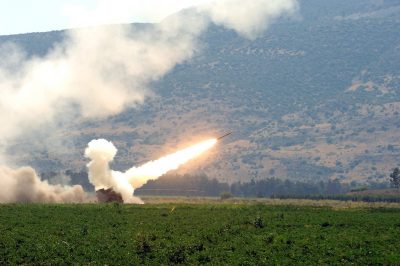Congress should work with the president to formally recognize Israeli sovereignty in the Golan. This is an urgent matter as Iran continues to increase its conventional threats to Israel.
Doug Lamborn is a Republican U.S. representative from Colorado.
Today, international attention is heavily focused on restraining Iran’s aspiration to develop nuclear weapons. Tehran, however, is using a large portion of its resources to increase its power by creating a continental corridor of terror, running from Tehran to the Mediterranean Sea. Syria is a critical piece of this corridor.
Iran and Syria recently signed a military cooperation agreement cementing Iran’s active and expanding presence in Syria. Whether it be Iranian soldiers, militias, or other proxies — Iran’s consolidation in Syria will soon be a fait accompli. The international community must go beyond merely condemning Iran’s nuclear aspirations. The international community must prioritize combatting Iran’s movements to enlarge its footprint in the region and ultimately destabilize it.
The United States faces a complex set of threats around the world. From North Korea’s nuclear ambitions to Russia’s pursuit of dominance on the world stage, there is no shortage of threats demanding America’s attention. Now we add this: the terrestrial border between the West and radical Islam is closing in on the border of the Golan Heights. Israel, the only democracy in the Middle East, faces the reality of Syrian forces on their northern border who are controlled and emboldened by Iran.
If Iran’s plan comes to fruition, the border of the Golan Heights will begin to look like Lebanon, where Iranian-backed militias have taken over the border and surrounding towns. Iranian concentration of the Shiite population along the border will increase, and they will continue stockpiling rockets to threaten northern Israel.
Iran understands that the way to challenge Israel is not necessarily through direct military confrontation, but rather through asymmetrical warfare — i.e. operating through proxy terrorist organizations and militias. These groups wreak havoc on the border and attack civilians, which heightens the tensions on the border. These tensions will drive the international community to push for Israel’s withdrawal from the Golan, which is what Iran wants.
The international community, including the United States, views the Golan Heights as “occupied territory.” In the event of a military escalation, Israel will find it difficult to attain international legitimacy should it need to explain her self-defense, in order to initiate a military operation deep into Syrian territory against Iranian aggression.
This scenario is neither unlikely nor far-fetched, as it already materialized in Gaza against Hamas and in Lebanon against Hezbollah. Both terror groups are funded by Iran. Escalation might encourage the international community to insist that Iran’s withdrawal from border areas be balanced with Israeli withdrawal from the Golan. This would significantly endanger Israel and the Kingdom of Jordan — two of America’s important allies in the Middle East. America must support Israel’s sovereignty in the Golan.
A shift in the Syrian theater is extremely consequential for American interests in the region. It is high time for the United States to make its interest clear and draw a red line regarding Iran’s ambitions in the Middle East. This new reality dictates that America can no longer rely on antiquated perceptions of the balance of power from the days before the Syrian civil war.
The conventional red line to Iran is marked on the hills of the Golan Heights. American recognition of Israel’s sovereignty over the Golan Heights will send a clear message to Iran that Israel’s sovereignty is undeniable and that attempts to challenge it are futile. It will also reduce the chances of a future military confrontation between Israel and Iran, which Israel might initiate in order to defend herself from Iranian aggression.
A conflict between Israel and Iran could potentially drag other countries into war, including the United States. President Trump understands the danger that Iran poses to the region. Mr. Trump made the important decision to withdraw the United States from the disastrous nuclear deal with Iran. He can continue this important leadership by recognizing Israel’s strategic placement and sovereignty over the Golan, which has the potential to contain Iran’s ambitions to establish a land bridge across the Middle East.
Congress should work with the president to formally recognize Israeli sovereignty in the Golan. This is an urgent matter as Iran continues to increase its conventional threats to Israel. Alliances in the Middle East are constantly changing, but right now a new one has emerged. Iran’s rising power has driven a rare coalition of Arab states in the Middle East to work with Israel, a country who decades ago they fought wars against. It is time for the United States to recognize Israeli sovereignty over the Golan Heights, both for Israel’s sake, but more importantly for continued security of the free world.



